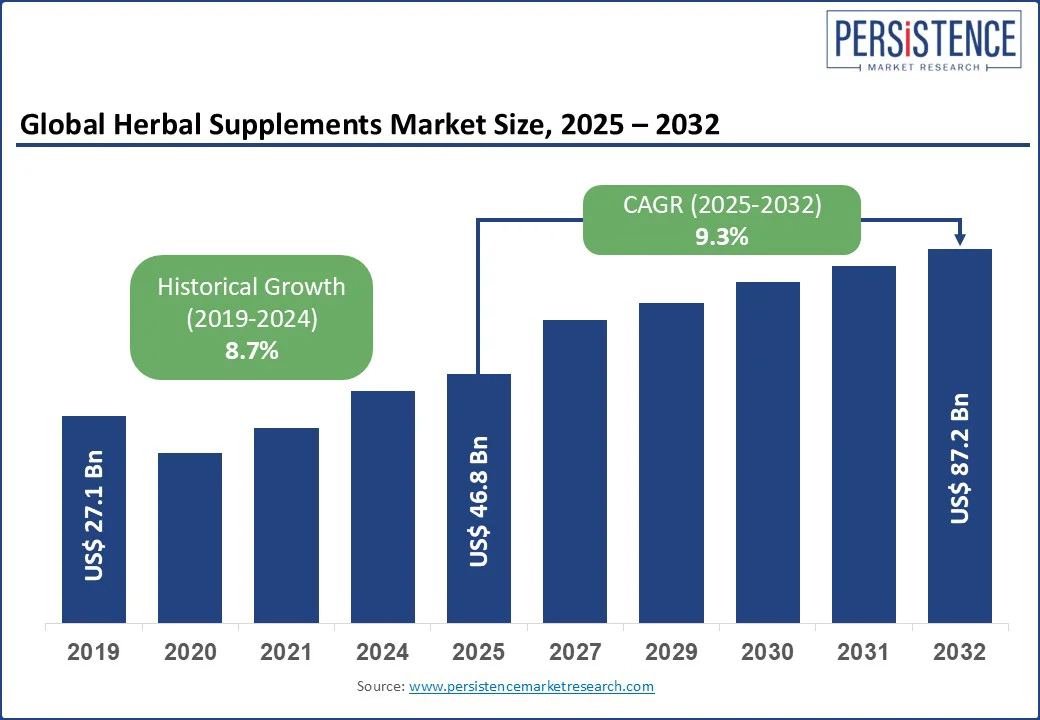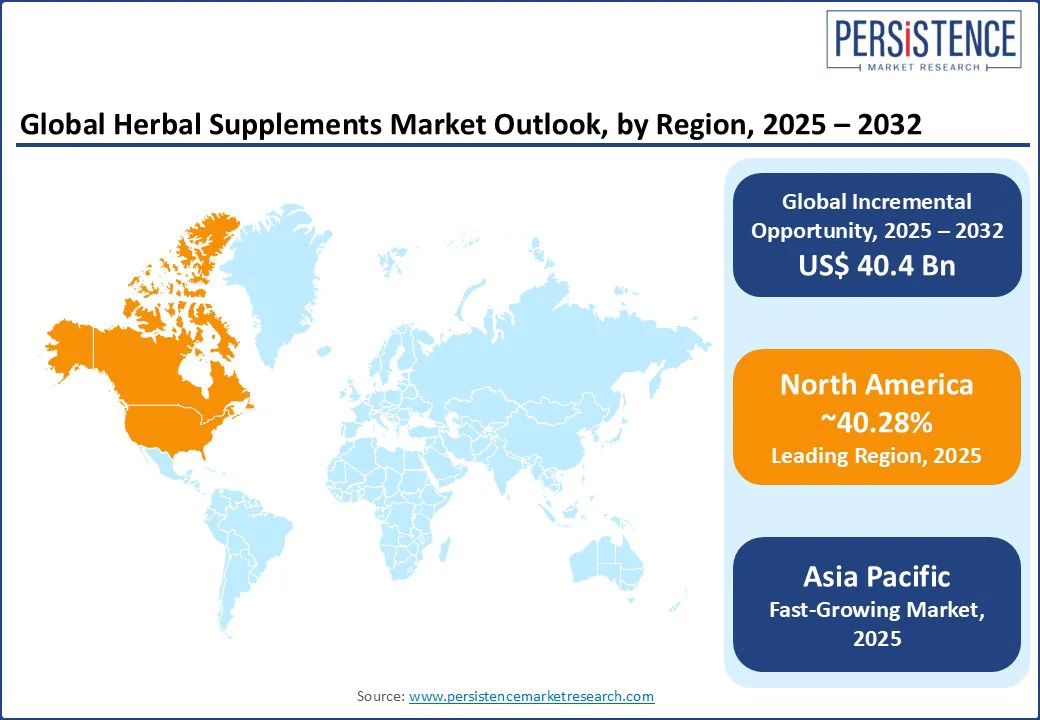ID: PMRREP32203| 186 Pages | 19 Aug 2025 | Format: PDF, Excel, PPT* | Healthcare

The global Herbal Supplements Market size is likely to value at US$ 46.8 Bn in 2025 and reach US$ 87.2 Bn by 2032, growing at a CAGR of 9.3% during the forecast period from 2025 to 2032.
The herbal supplement industry is experiencing robust growth, driven by increasing consumer preference for natural and organic health solutions, rising awareness of preventive healthcare, and the expansion of retail and e-commerce channels. Herbal supplements, valued for their perceived health benefits and minimal side effects, appeal to health-conscious consumers seeking alternatives to synthetic drugs.
The growing prevalence of lifestyle-related diseases and strong retail infrastructure in developed and emerging markets further propel market expansion.

Key Industry Highlights
|
Global Market Attribute |
Key Insights |
|
Herbal Supplement Market Size (2025E) |
US$ 46.8 Bn |
|
Market Value Forecast (2032F) |
US$ 87.2 Bn |
|
Projected Growth (CAGR 2025 to 2032) |
9.3% |
|
Historical Market Growth (CAGR 2019 to 2024) |
8.7% |
The rising demand for natural and preventive healthcare solutions is a major driver of the global herbal supplements market. With growing awareness of lifestyle-related diseases, consumers are increasingly turning to herbal supplements such as turmeric, ginseng, and moringa for their anti-inflammatory, immune-boosting, and antioxidant properties.
According to the World Health Organization, non-communicable diseases account for 74% of global deaths, prompting a shift toward preventive health measures. In 2023, the global dietary supplement market, including herbal products, was valued at $150 billion, per Euromonitor International.
For instance, Nature’s Bounty reported a sales increase in turmeric supplements in 2024, driven by consumer demand for natural remedies. Government initiatives, such as India’s AYUSH Ministry promoting traditional medicine, further boost adoption. In developed markets such as the U.S., the National Institutes of Health notes rising consumer spending on herbal supplements, particularly among aging populations seeking wellness solutions. This trend ensures sustained market growth through 2032, driven by health consciousness and natural product preferences worldwide.
Regulatory challenges and quality concerns pose significant hurdles to the herbal supplements market, particularly for smaller manufacturers. Stringent regulations in regions such as the European Union, where the European Medicines Agency enforces strict quality and safety standards, increase compliance costs.
Additionally, concerns about product adulteration and inconsistent potency deter consumers, with 15% of herbal supplements failing quality tests in 2023, according to a U.S. FDA report. Limited standardization in emerging markets such as Africa, where limited herbal products meet international quality standards, further restricts market penetration. Consumer skepticism about efficacy and potential side effects also hinders adoption, particularly in regions with low health literacy.
The rising consumer focus on organic and plant-based supplements presents significant opportunities for the herbal supplements market. Increasing awareness of sustainability and clean-label products drives demand for organic moringa, turmeric, and echinacea supplements. In Asia Pacific, where traditional herbal medicine is prevalent, companies such as Ancient GreenFields reported sales growth in organic moringa products.
Government initiatives, such as the EU’s Organic Action Plan, promote organic certifications, encouraging manufacturers to innovate. Retailers are dedicating shelf space to premium, plant-based supplements, enabling brands such as Gaia Herbs and NOW Foods to tap into premiumization trends through 2032, aligning with global sustainability goals.
North America remains the leading region in the herbal supplements market, accounting for approximately 40.28% of the global market share in 2025. This dominance is largely due to high consumer awareness about natural health products, coupled with a well-established and diverse retail infrastructure across the U.S. and Canada.
According to the American Botanical Council (ABC), retail sales of herbal dietary supplements in the U.S. reached $15.551 billion in 2023, reflecting a healthy 4.4% growth over the previous year. This increase underscores the region’s sustained consumer interest in botanical wellness solutions.
Major players like Nature’s Bounty and NOW Foods lead the market by offering a wide range of herbal formulations targeting immunity, digestion, stress relief, and overall wellness.
The Asia Pacific region is currently the fastest-growing market for herbal supplements, propelled by increasing disposable incomes, heightened health awareness, and the long-standing cultural reliance on traditional herbal remedies, especially in countries like India and China. Consumers in these nations are increasingly turning to natural health products to support wellness, immunity, and chronic condition management.
In 2024, India’s herbal supplement sector witnessed a significant growth, largely supported by government initiatives such as the AYUSH Mission, which promotes Ayurveda, Yoga, Unani, Siddha, and Homeopathy as part of a holistic healthcare system. This mission fosters research, quality standardization, and wider accessibility of herbal products, boosting consumer confidence and market expansion.
The herbal supplements market in Europe is experiencing robust growth, positioning the region as the second fastest-growing globally. This expansion is fueled by a combination of strict regulatory frameworks, rising health consciousness, and a surging demand for organic and clean-label products, particularly in countries like Germany and France. These markets are known for their educated consumer base, who actively seek natural alternatives to synthetic health products.
A significant driver is the European Union’s Organic Action Plan, which promotes sustainable agriculture and organic certification, thereby encouraging both production and consumption of herbal supplements derived from organically grown ingredients.

The global herbal supplements market is highly competitive, with key players such as Jarrow Formulas, Solgar, Nature’s Bounty, and Gaia Herbs dominating through extensive product portfolios and distribution networks. Regional players such as Ancient GreenFields focus on localized offerings in the Asia Pacific. Companies are investing in organic certifications and sustainable packaging to enhance market share, driven by consumer demand for natural products.
The Herbal Supplements market is projected to reach US$ 46.8 Bn in 2025.
Rising consumer preference for natural and preventive healthcare and expanding retail channels are the key market drivers of the Herbal Supplement Market.
The Herbal Supplements market is poised to witness a CAGR of 9.3% from 2025 to 2032.
The growing demand for organic and plant-based supplements is the key market opportunity.
Jarrow Formulas, Solgar, Nature’s Bounty, and Gaia Herbs are a few key market players.
|
Report Attribute |
Details |
|
Historical Data/Actuals |
2019 - 2024 |
|
Forecast Period |
2025 - 2032 |
|
Market Analysis Units |
Value: US$ Bn/Mn, Volume: As Applicable |
|
Geographical Coverage |
|
|
Segmental Coverage |
|
|
Competitive Analysis |
|
|
Report Highlights |
|
|
Customization and Pricing |
Available upon request |
By Product Type
By Formulation
By Distribution Channel
By Region
Delivery Timelines
For more information on this report and its delivery timelines please get in touch with our sales team.
About Author